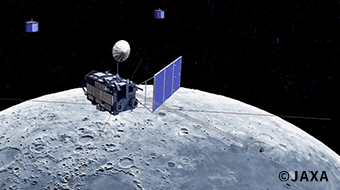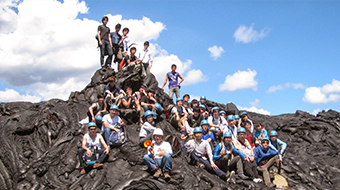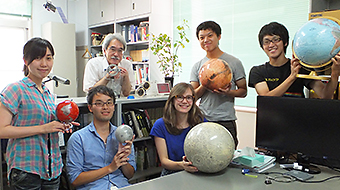Education
Earth and Planetary Sciences Undergraduate Major5 Features
Learning experience that engages students
with the earth's dynamism
-
1
Where dreams of the earth, planets,
and universe take flight
Since its founding in 1992, the Department of Earth and Planetary Sciences has been producing outstanding research at the global level. Students enthralled by the earth and universe's phenomena come from across the country to study here.
This is a place where individuals can play a part in unraveling the evolution of the earth and planets both within and beyond our solar system and contribute to the earth's future through the power of science. This is a place where childhood dreams take shape and take flight. -
2
A place of learning with friendly and attentive faculty

Undergraduate students majoring in Earth and Planetary Sciences enjoy a high degree of autonomy with regard to their studies. Apart from three compulsory courses — one laboratory course, Research Opportunity in Laboratories, and Independent Research Project — students are free to choose the courses they take. Even the laboratories that students join to conduct their Independent Research Project are decided by the students themselves.
Students are also active in improving the quality of instruction they receive. Since the department's founding, they have conducted their own course evaluation surveys, the results of which are announced and submitted in the form of reports to faculty members. -
3
Revealing the genesis of the solar system through
space and planetary exploration missions
Our solar system was born 4.6 billion years ago. How exactly the planets, including the earth, came into being has long fascinated scientists. The department collaborates with observatories and space agencies from around the world to conduct science missions essential to acquiring data related to the formation of planets. This data is then consolidated with theory to uncover the formation and evolution of planets. Students have the chance to hear the latest research findings through classes and student-organized Earth and Planetary Science Seminars.
-
4
Experiencing the earth's dynamism through overseas field trips

The department's very popular Field Excursion course provides opportunities for students to get out of Japan and experience the natural world firsthand. By exploring places such as the Grand Canyon, Death Valley, and Arizona's Meteor Crater, they get to perceive the earth's dynamism. Visits to local universities and research institutes are also included in the itinerary, where students' communication skills are put to the test.
The tour provides the first step to becoming earth and planetary scientists. -
5
Laboratories as a gateway into the global arena of research

Once students join a laboratory, they begin working on their Independent Research Project. Their chosen methods of research vary widely. Some are involved in numerical computations, some conduct field studies, while others utilize the department's facilities to obtain measurements. Students are given their own desk in the student room common to all laboratories. By working alongside individuals of diverse specializations, students are able to maintain a broad perspective while pursuing their areas of interest.
